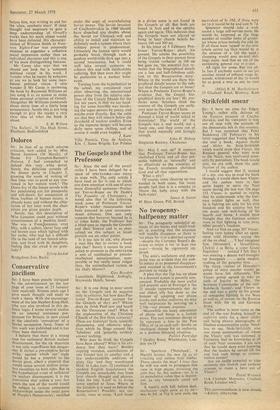Sir: It is one thing to pour scorn on the
Gospels and be negative only in criticism, but how does Pro- fessor Trevor-Roper account for the Gospels as they are? Whom does he think Paul saw and heard on the Damascus road? What is the explanation of the Christian Church of the first three centuries? These are historical facts, scientific phenonema, and offensive adjec- tives which he flings around like 'fabulous' and `palpable rubbish' answer nothing.
Why does he think the Gospels have been altered? What is his evi- dence that they have? Besides copying mistakes, assimilations of one Gospel text to another and a few understandable additions of piety like `and they worshipped Him' in Luke xxiv. 52 (omittted in modern English translations) the Gospels arc remarkably free from later church thought and phrases. Take the title 'Lord' in its divine sense applied to Jesus. Where in the Gospels is it used so before the Resurrection? Possibly, not cer- tainly, once or twice. 'Lord Jesus' in a divine sense is not found in the Gospels at all. But both are
found in Acts and in the epistles again and again. This indicates that the Gospels were not altered to bring in later church beliefs be- tween 100 and 300 AD.
In his letter of 5 February Pro- fessor Trevor-Roper alters his ground. He admits the possibility
of the Gospels in their present form being 'extant verbatim' in 100 AD
but goes on, 'the essential fact re- mains that the biographical details are a late and half-fabulous addi- tion to the Resurrection story'. Where in the world are there bio- graphical details nearer to the sub- ject than the Gospels are to Jesus?
Where is Professor Trevor-Roper's evidence that the Gospel bio- graphical details are late? He pro- duces none. Scholars think the sources of the Gospels are early, very near to the time of Christ.
Professor Trevor-Roper seems to demand a kind of world suited to historians! The world of the Gospels was a real world, not a fancy one, and they come out of that world naturally and fittingly enough.










































 Previous page
Previous page